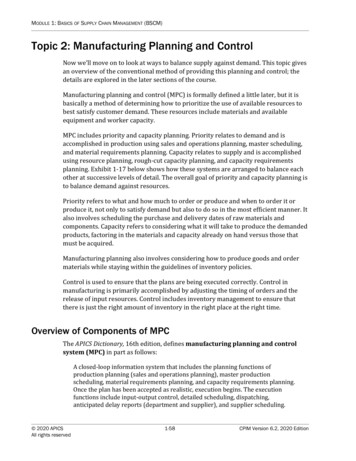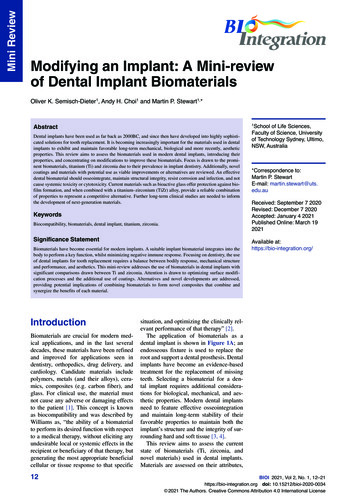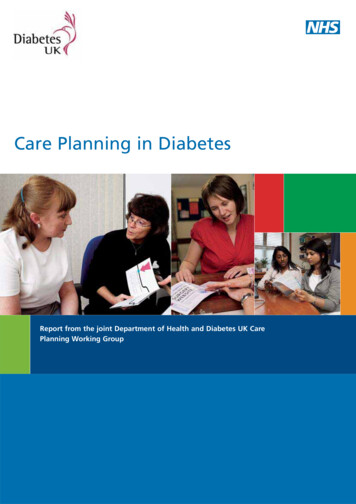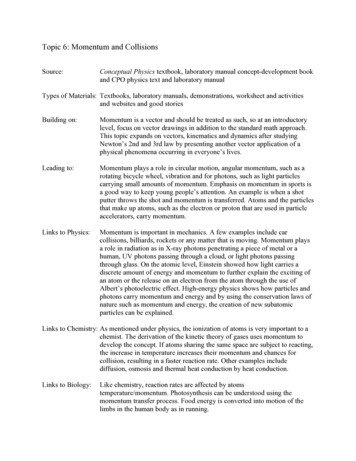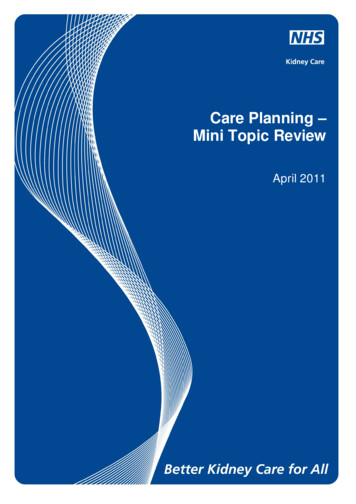
Transcription
Care Planning –Mini Topic ReviewApril 2011
Reader PageTitleCare Planning Mini Topic ReviewAuthorDr Felix MukoroPublication DateApril 2011Target AudienceCommissioners, nephrologists, renalnurses, home dialysis nurses, renal socialworkers, home dialysis patients, carers,primary care practitionersCirculation ListAvailable online at www.evidence.nhs.ukand www.kidneycare.nhs.uk.Description/purposeThis review examines the evidence relatingto the experiences of patients andhealthcare professionals in the careplanning process, in order to determinefactors that influence successfuldevelopment of a care plan.Cross Refn/aSuperseded Docsn/aAction RequiredTo review and consider in context of localprovision for care planning and shareddecision making.TimingThis report supports the governmentcommitment to a patient-led NHS, ensuringthat patients have genuine choice overtheir treatment options.Contact detailsadmin@kidneycare.nhs.uk2
ContentsReader Page.2Acknowledgments .41.Introduction.51.1Background.51.2Aim .61.3Objectives .61.4Review Question.61.5Outline of the Report .62Terminology.73Review of Policy Documents on personalised Care Planning .94Review methods .144.15Study selection (inclusion and exclusion criteria; methods).14Results of the review .155.1Study Characteristics .155.2Findings of the review . 165.2.1 Studies that examined patient and clinician perspectives on care planning andshare decision making.165.2.2Studies that examined preparing participants for care planning meeting.185.2.3Studies that examined forum for decision making. 205.2.4Studies that examined experience of participation in decision making.235.2.5 Studies that examined impact of self care support within the care planningprocess on patient outcomes.266Discussion .286.1Statement of principal findings.286.2Implications of findings.306.3Limitations of review .317Conclusions.328References .33Appendix A .383
AcknowledgmentsThanks to Dr Simon Eaton, Consultant Diabetologist at Northumbria Healthcare NHSFoundation Trust, and Professor Paul Roderick, Professor of Public Health and Head ofPrimary Care and Population Sciences at the University of Southampton, for reviewing thisdocument and offering helpful and insightful feedback.4
1. Introduction1.1 BackgroundThe involvement of patients in health decision-making is now a central theme of national andlocal policy in the NHS (1)(2). This is underpinned by the conviction that individualinvolvement and empowerment are critical to improving health outcomes (3-6). The burdenof chronic and long term conditions is growing, and this has exposed significant limitations intraditional models of care delivery which are typically reactive, curative and focused onacute, episodic illness (7). Patient involvement improves patients’ experience andsatisfaction with NHS services, as well as the appropriateness and outcomes of care (7)(1).Research shows that patients feel involved in their care when they are treated as equalpartners, listened to, and provided with adequate information (1). Furthermore, patientinvolvement enables self-management (1)(8).Since the 1990s the United Kingdom policy has stated a strong commitment to supportpeople to self care. According to Skills for Care (2008) (3), supporting self care is aboutpartnership working between the individual and the care professional in an ongoing processof two-way communication, negotiation and decision making whereby both parties contributeto the care planning process to achieve the best possible outcomes for the individual. In2006, the White Paper ‘Our health, our care, our say’ (6) emphasised the government’scommitment to supporting self care and developing and delivering services around theneeds of the individual and in partnership with them. ‘Supporting People with Long TermConditions to Self Care’ (9) restated this commitment and stressed a shift of values towardsindividuals’ empowerment and self care. Support for self care increases the capacity,confidence and efficacy of individuals to take care of their own health and well being (10).The principles of self care are underpinned by a value base which focuses on personcentredness, partnership working and shared decision making (3).Individuals will need good understanding of their condition as well as access to anyadditional information they need in order to self-manage effectively and participate in anydecision making processes (4). This highlights the importance of user involvement in thedevelopment of interventions intended to empower and enable people with long-termconditions (11). Care planning is about the process of negotiation, discussion and decisionmaking that takes place between the professional and individual (12). The care planningprocess brings together the concepts and principles of patient involvement, shared decisionmaking, self-care support and patient centred care. Despite a growing recognition of theimportance of taking a person-centred and integrated approach to care planning theexperience of people accessing services varies significantly (13).5
1.2 AimTo explore the process of care planning/shared decision making and describe theexperiences of patients and healthcare professionals in order to determine factors thatinfluence successful development of a care plan.1.3 Objectivesa. To review the published evidence relating to care planning for long term conditions inorder to identify key knowledge areas.b. To review policy documents to highlight the direction of current policy in relation to careplanning for long term conditions.c. Produce a mini topic review of care planning for long term conditions which present asynopsis of the available evidence by identified themes.1.4 Review QuestionThe focus of the review will be on the following question:For patients with long term conditions, what factors determine success in the careplanning process?1.5 Outline of the ReportThis paper falls into seven main sections. The next section is a discussion of theterminology. The third section reviews policy documents relating to care planning. The fourthsection outlines the methods used for this review. The fifth section contains the results of thereview. Following this section, is a more general descriptive narrative of the findings andtheir implications, and a discussion of the limitations of this review. The conclusions drawnfrom this review are provided in Section 7.6
2 TerminologySeveral terms are found in the literature that link with the concepts of care planning. Theyinclude; "nursing plan", "treatment plan", "discharge plan" and “action plan". While theseterms refer to aspects of the care planning process, they do not include the concept ofpatient involvement and shared decision making, which is key to the care planning process.For example, the nursing care plan was defined as 'a written guide to the individual patient’snursing needs, purposefully stated so that appropriate nursing actions are specific or implied’(14) (15).Often in the literature, there was an assumption that care planning can be understoodwithout definition. However, a consistent concept echoed across a limited number of papersportray care planning as a process of collaborative care and joint working between thepatient and the health professional, underpinned by the principles of patient centredness andpartnership working (16); (17)(12). This process provides an opportunity for patients withlong term conditions and the health professional to share their perspectives and to makejoint decisions on actions needed to minimise health risks (16). This results in thedevelopment of a plan of action that is envisaged to eventually lead to improved quality oflife, improved clinical outcomes and improved patient well-being. The process encouragesprovision of support to the individual patients, which will enable them to develop confidenceand competence in managing the challenges of living with their condition (12).The care planning approach is inherently holistic and person-centred rather than conditioncentred and offers a model of care for people with long term conditions (17). According toDiabetes UK Care Planning Working Group (2006) (17), this approach provides a singlecomprehensive and patient-centred review for those who have other co-existing healthconditions. This is particularly important in situations where patients have multiple chronicconditions necessitating the involvement of more than one health care team, which maycompound the number and type of decisions required. For example, some patients withchronic kidney disease may also have diabetes mellitus and/or cardiovascular disease. ForDiabetes UK Care Planning Working Group (2006) (17), care planning should enhance andpromote coordination of health and social care services at an organisational level, whilesupporting local commissioning. The care planning approach aims to provide high qualitycare personalised to meet the needs of the individual patient, taking into consideration allaspects of the person’s life (18) (19).For people with long term conditions, the development of a personalised care plan has beenstrongly advocated (1,6,9,11,17,20-23) and this is central to empowering the patient to take7
control of their health and their life. A care plan records the outcome of the care planningdiscussion between an individual and their health professional. In addition to documentingchoice and preferences as discussed in the care planning consultation, the care planoutlines a specific set of actions, the person(s) responsible for each action, and thetimescale for completion of these actions as agreed by parties to the care planning process(17). Depending on the health and social care needs of the individual, the care plan can be asimple or complex document which is either a written or electronic record containing all theinformation the individual needs in order to effectively manage their own health (11,24,25).The care plan is owned by the individual who should be given a copy if they want one (25).Where the care plan is written in a separate document from the health records, it should bestored in the person's medical record (25), and made available when the person accessesany part of the service (17). Copies should also be accessible to all health and social careprofessionals involved in the patient’s care (25).8
3 Review of Policy Documents on personalised Care PlanningFor many years now, UK health policy has demonstrated a clear understanding of thecomplex needs people with long term conditions, showing a strong commitment towardstheir care. The paper, ‘Supporting People with Long term Conditions’ (11), proposed anintensive, on-going and personalised case management for people with long term conditionswhich will help to improve the quality of life and outcomes for these patients. One of thesteps to achieving this involves carrying out thorough assessments and development of acare plan to reflect the personal needs and aspirations of the patient and their carer(s).Another paper, ‘Self care – A real choice: self care support – a practical option’ (10), setsout the position on the Department of Health's policy to support self care, highlighting thatwith the right support people can be e
For example, the nursing care plan was defined as 'a written guide to the individual patient’s nursing needs, purposefully stated so that appropriate nursing actions are specific or implied’ (14) (15) . Often in the literature, there was an assumption that care planning can be understood without definition. However, a consistent concept .

